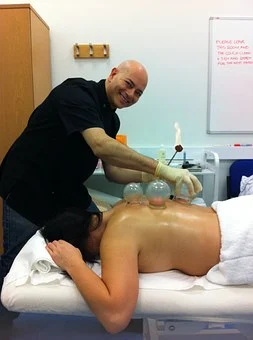Cupping is a form of therapy in which anywhere between three to seven heated cups are placed on the skin to promote healing and soothe sore muscles (via WebMD). The rounded cups stay in place for several minutes, and the suction created forces blood to the surface, sometimes resulting in bruises. Dry cupping involves a heated cup on dry skin. With wet cupping, a medical professional punctures the skin with a needle (via Cleveland Clinic). Many ancient cultures have used these techniques, but what exactly happens to your body during a cupping session?
拔火罐是一種治療方式,將三到七個(gè)加熱的杯子放在皮膚上����,以促進(jìn)愈合和緩解肌肉酸痛����。圓形的杯子會(huì)在原地停留幾分鐘�����,產(chǎn)生的吸力會(huì)迫使血液流到表面��,有時(shí)會(huì)導(dǎo)致瘀傷�。拔火罐是把熱的杯子放在干燥的皮膚上����。通過濕拔罐,醫(yī)療專業(yè)人員用針刺穿皮膚�����。很多古代文化都使用過這些技巧�,但拔罐過程中,你的身體到底發(fā)生了什么?
The idea behind cupping is to reduce pain and boost healing through increased blood flow and circulation. Licensed acupuncturist Anna Brantman, from Cedars-Sinai Integrative Health, says that many of her patients usually feel the results of cupping immediately. One 2015 report showed that cupping could help manage pain as well as treat acne, herpes zoster, and facial paralysis. During some sessions, the cups may be placed on acupressure points, which may in turn treat skin and digestion problems as well as other ailments for which acupressure is used (via Healthline). Other claims allege wet cupping removes toxins from the blood, but more research is needed (via WebMD).
拔火罐的原理是通過增加血液流動(dòng)和循環(huán)來減輕疼痛和促進(jìn)愈合����。西達(dá)斯-西奈綜合健康中心的注冊(cè)針灸師安娜·布蘭特曼說,她的許多病人通常能立即感受到拔罐的效果�����。2015年的一份報(bào)告顯示,拔火罐不僅可以幫助控制疼痛��,還可以治療痤瘡����、帶狀皰疹和面部癱瘓。在一些療程中��,杯子可能被放置在穴位上�,從而治療皮膚和消化問題以及其他使用穴位按摩的疾病。還有一些說法稱��,濕拔罐可以清除血液中的毒素��,但還需要更多的研究����。

Both types of cupping techniques are similar. A dry cupping session includes placing the cup on areas of dry skin. The suction creates a vacuum, pulling the skin, muscles and other tissue into the cup. The practitioner may leave the cup in place for five to ten minutes before removal. During a wet cupping session, the professional removes the cup after just a few minutes and makes a prick with a needle, sometimes replacing the cup. After a session, the skin is treated with a salve to prevent infections.
這兩種拔火罐技術(shù)是相似的。干拔是把杯子放在干燥的皮膚上�����。吸力產(chǎn)生真空�,將皮膚、肌肉和其他組織拉入杯中。醫(yī)生可以在取出杯子之前將杯子留在原地5到10分鐘�。在濕拔火罐過程中�����,專業(yè)人員在幾分鐘后就把杯子拿出來��,用針扎一下��,有時(shí)還會(huì)換一個(gè)杯子�����。一段時(shí)間后��,皮膚會(huì)用藥膏治療以防止感染�。
Cupping is generally considered a safe practice. However, some patients might experience burns. Other risks include skin infections, itching, or scarring. Muscle soreness, headaches, and nausea might also occur after a treatment (via Cleveland Clinic).
拔火罐通常被認(rèn)為是一種安全的做法。然而����,一些患者可能會(huì)出現(xiàn)燒傷。其他風(fēng)險(xiǎn)包括皮膚感染�、瘙癢或留下疤痕。肌肉酸痛��、頭痛和惡心也可能發(fā)生在治療后。
If you have any bleeding disorders, blood clotting problems, or a history of stroke, you should consult with your healthcare provider before making an appointment with a cupping specialist. Likewise, those with sensitive skin or those who suffer from seizures should also seek medical advice before a cupping session.
如果你有任何出血疾病�����、凝血問題或中風(fēng)史��,你應(yīng)該先咨詢你的醫(yī)療服務(wù)提供者�,然后再去看拔火罐專家。同樣�����,皮膚敏感或癲癇患者在拔火罐前也應(yīng)征求醫(yī)生意見�����。